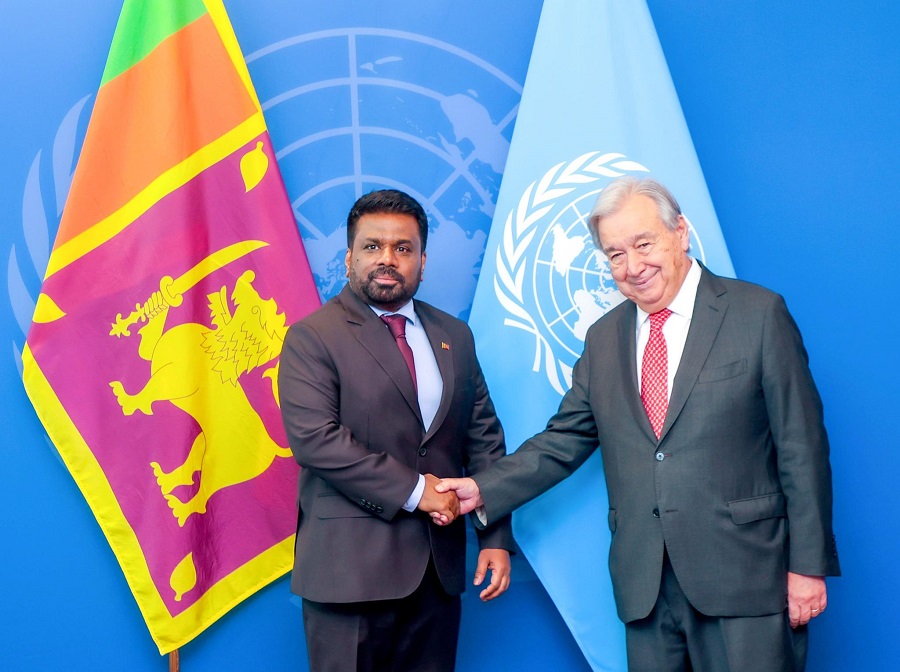-By Aanubhawananda

(Lanka-e-News - 29.Sep.2025, 11.30 PM) September has always been a peculiar month in Sri Lanka’s political calendar. For nearly a decade, it was the month when the self-styled “Maharaja” Mahinda Rajapaksa would jet off to New York, not so much to address the United Nations General Assembly for five minutes, but to indulge in what became an annual state-funded carnival of excess.
Between 2006 and 2014, Rajapaksa travelled with entourages so vast that they rivalled African monarchs and Gulf sheikhs. Ministers, MPs, provincial grandees, loyalists, hangers-on, media flunkeys, family and extended kin—sometimes numbering over 200—were all bundled into a chartered aircraft, the cost borne, naturally, by the Sri Lankan taxpayer.
The bill was staggering. Flights, luxury hotels, meals, allowances of more than $100 per day for each delegate, and fleets of limousines hired at inflated rates. Hundreds of millions of rupees drained from the national exchequer each year—an exchequer funded not only by tycoons but by ordinary citizens paying indirect taxes on their daily loaf of bread or a teaspoon of sugar.
Corruption thrived. Travel agents, hoteliers and limousine suppliers pocketed inflated sums. Diplomats colluded with “international Rajapaksa loyalists” to overcharge the state. Limousine scams became routine—cars that could have been hired from American firms at market rates were instead sourced via middlemen at triple the cost, with kickbacks flowing liberally.
The UN stage itself offered little in return. Rajapaksa would use his allotted minutes to boast about Sri Lanka’s “2,500 years of history”, often provoking raucous applause from his “bayya” supporters in the galleries. For the rest of the entourage, the trip meant sightseeing, shopping and fine dining across Manhattan. The President’s vanity junkets became an annual ritual of waste.
His successors offered little improvement. Maithripala Sirisena and Ranil Wickremesinghe merely inherited the extravagance, continuing the pattern of bloated delegations and lavish expense. Gotabaya Rajapaksa was perhaps the only leader to attempt modest restraint, though his presidency was short-lived.
This September marked a rupture with that tradition. On 24th September, President Anura Kumara Dissanayake made his maiden address to the UN General Assembly. Unlike his predecessors, he travelled with just four officials—Foreign Minister Vijitha Herath and a small team from the Ministry of Foreign Affairs.
He imposed strict instructions: no unnecessary spending, no hired limousines, no five-star hotels. Security and official transport were provided by the UN and the host government. If additional transport was needed, the delegation was to use Uber. The President stayed in a modest mid-range hotel, spending three days engaged in bilateral meetings with world leaders and international organisations, including a discussion with UN Human Rights Commissioner Volker Türk.
Dissanayake’s address—lasting a full ten minutes—was devoid of the parochial chest-thumping of the past. He spoke instead of global poverty, debt crises, corruption, narcotics trafficking, and the plight of Gaza. He called for a two-state solution for Palestine, denounced the futility of endless wars, and urged international cooperation against extremism and nationalism.
It was a message that resonated. Al Jazeera English and other international broadcasters highlighted his remarks. Social media platforms carried clips of his speech, with YouTube channels describing him as a “Global South leader calling for justice and reform.” The UN’s official YouTube stream showed Dissanayake’s speech among the most-watched of this year’s General Assembly. Within three days, it had crossed the 100,000 mark.
For once, Sri Lanka’s presence at the UN was noticed for substance rather than spectacle.
Yet there were omissions. Dissanayake condemned Israel’s assault on Gaza but was silent on Russia’s invasion of Ukraine. To ignore one occupation while denouncing another risks inconsistency—there can be no selective solidarity when standing with the oppressed.
Even so, his speech marked a striking departure from decades of vanity and waste. At last, a Sri Lankan leader had stood on the world stage not to flatter his domestic loyalists but to invite the international community to reckon with pressing global crises.
Small wonder the “Rajapaksa bayyas” and their nationalist allies back home squirmed. For them, September will always recall the blood-red meat feasts and limousine rides of Mahinda’s glory days in Manhattan. But times—and rhythms—have changed.
The age of junkets is over. New York in September is no longer a playground for bloated entourages at taxpayers’ expense. Instead, it is where Sri Lanka, for the first time in decades, has begun to speak with clarity and humility to the world.
-By Aanubhawananda
---------------------------
by (2025-09-29 22:14:30)
Leave a Reply